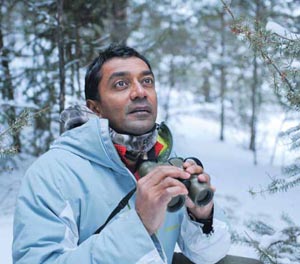Campus News
Alumni Profile / M. Sanjayan: Scientist of the world
As a hard-working Ph.D. student at UC Santa Cruz, M. Sanjayan—now lead scientist for the Nature Conservancy—never expected to be a spokesperson, a TV personality, or a guest on the Late Show with David Letterman.

As a hard-working Ph.D. student at UC Santa Cruz, M. Sanjayan (biology Ph.D., ’97) never expected to be a spokesperson, a TV personality, or a guest on the Late Show with David Letterman.
But he found himself calming his nerves in the green room at the Ed Sullivan Theater, where he and the actor Jack Black waited their turns on the hot seat with Letterman.
Sanjayan admits to a case of nerves—”The show could have gone sideways,” he said. “At one point I forgot my mother’s name.”
In the end, the show went just fine. Sanjayan, lead scientist for the Nature Conservancy—one of the most influential conservation groups in the country—even drew a chuckle from the host and a couple of good-sized laughs from the audience when he said that this generation “does not want to be remembered as a bunch of losers” who failed to save their own planet.
Besides, he’s growing accustomed to surreal situations. His high-profile career keeps him traveling across the globe almost constantly and places him squarely in the public eye, whether he’s reporting on Bangladeshi tigers, global warming, strange weather, extinctions, rising sea levels, or mega-fires.
Along the way, Sanjayan, who was born in Sri Lanka, was hailed as an advocate for diversity— in all its forms—in a Time magazine article entitled “Changing the White Face of the Green Movement.”
While he’s very happy to be an example for others, he says the picture is “changing, but bloody slowly.”
UCSC played a decisive role in his present career. Though he admits that he is “not one of those people who loves being on television,” he comes across as confident and very much in the know—two traits he attributes in large part to his graduate school experience here.
“While I was at UCSC I didn’t think much about conservation,” he said. “I mostly thought about taking on difficult questions.” But his studies made him feel qualified to speak up.
“My mentor Michael Soulé (now professor emeritus of environmental studies) told me that my job as a graduate student was to train myself as a critical thinker. The time to save something would come later, he told me,” Sanjayan said. “At the same time, he was very clear, in his graduate seminars, that you could not lead a narrow life. Even though you’re trained as a scientist, it doesn’t exempt you from participating in public life.”
These days, Sanjayan continues to embark on broadcasting adventures across the globe— he recently reported on Kenyan conservation advocates removing part of the tusks of live elephants to make them less attractive to poachers—while maintaining strong credentials in the scientific community.
“I am a scientist. I have a science background. I teach. I still read science papers and occasionally publish,” he said. “This gives me the confidence to be in front of the camera.”
He needs that confidence to address complex topics in ways that a lay audience can understand, and he needs that grounding to change minds about essential issues including climate change.
“It has to have this personal relevance to what impacts people’s lives today,” he said.
Extreme weather events, lack of snowfall, drought, and mega-fires have all done their part to change thinking, as did the devastation of Hurricane Sandy. In that storm’s aftermath, he said, “you had some major people taking stances and saying what everyone else was merely thinking.”